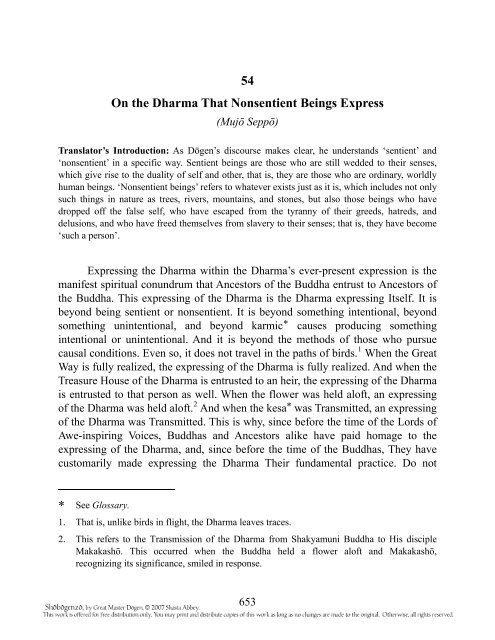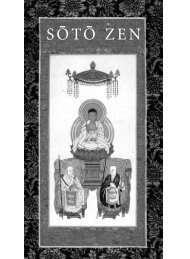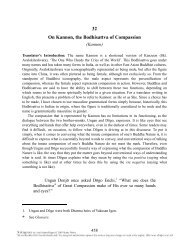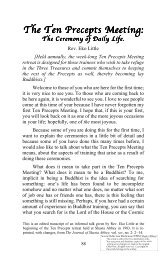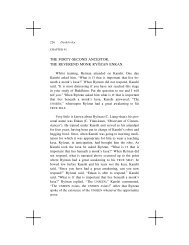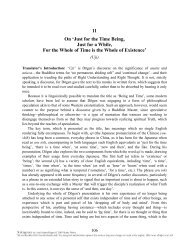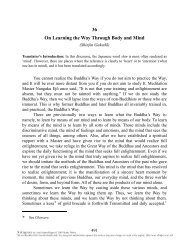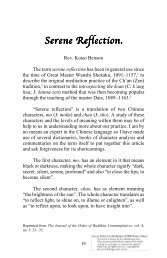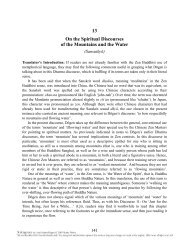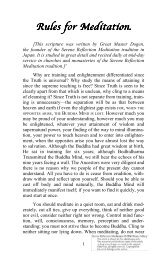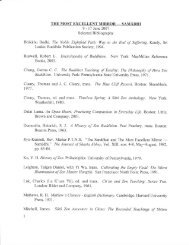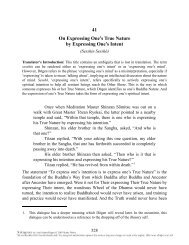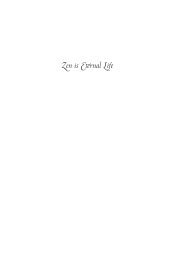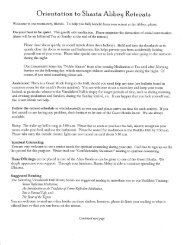Mujo Seppo - thezensite
Mujo Seppo - thezensite
Mujo Seppo - thezensite
Create successful ePaper yourself
Turn your PDF publications into a flip-book with our unique Google optimized e-Paper software.
54<br />
On the Dharma That Nonsentient Beings Express<br />
(Mujō Seppō)<br />
Translator’s Introduction: As Dōgen’s discourse makes clear, he understands ‘sentient’ and<br />
‘nonsentient’ in a specific way. Sentient beings are those who are still wedded to their senses,<br />
which give rise to the duality of self and other, that is, they are those who are ordinary, worldly<br />
human beings. ‘Nonsentient beings’ refers to whatever exists just as it is, which includes not only<br />
such things in nature as trees, rivers, mountains, and stones, but also those beings who have<br />
dropped off the false self, who have escaped from the tyranny of their greeds, hatreds, and<br />
delusions, and who have freed themselves from slavery to their senses; that is, they have become<br />
‘such a person’.<br />
Expressing the Dharma within the Dharma’s ever-present expression is the<br />
manifest spiritual conundrum that Ancestors of the Buddha entrust to Ancestors of<br />
the Buddha. This expressing of the Dharma is the Dharma expressing Itself. It is<br />
beyond being sentient or nonsentient. It is beyond something intentional, beyond<br />
something unintentional, and beyond karmic * causes producing something<br />
intentional or unintentional. And it is beyond the methods of those who pursue<br />
causal conditions. Even so, it does not travel in the paths of birds. 1 When the Great<br />
Way is fully realized, the expressing of the Dharma is fully realized. And when the<br />
Treasure House of the Dharma is entrusted to an heir, the expressing of the Dharma<br />
is entrusted to that person as well. When the flower was held aloft, an expressing<br />
of the Dharma was held aloft. 2 And when the kesa * was Transmitted, an expressing<br />
of the Dharma was Transmitted. This is why, since before the time of the Lords of<br />
Awe-inspiring Voices, Buddhas and Ancestors alike have paid homage to the<br />
expressing of the Dharma, and, since before the time of the Buddhas, They have<br />
customarily made expressing the Dharma Their fundamental practice. Do not<br />
* See Glossary.<br />
1. That is, unlike birds in flight, the Dharma leaves traces.<br />
2. This refers to the Transmission of the Dharma from Shakyamuni Buddha to His disciple<br />
Makakashō. This occurred when the Buddha held a flower aloft and Makakashō,<br />
recognizing its significance, smiled in response.<br />
653
Shōbōgenzō: On the Dharma That Nonsentient Beings Express 654<br />
explore through your training that expressing the Dharma is something that the<br />
Buddhas and Ancestors have customarily regulated, for it is They who have been<br />
regulated by the expressing of the Dharma. This expressing of the Dharma is not<br />
limited to the expounding of the eighty-four thousand gates that make up the whole<br />
of the Dharma; there are immeasurable, limitless gates that make up the whole of<br />
the expressions of the Dharma. So, do not explore through your training that<br />
expressions of Dharma by former Buddhas are what constitute expressions of<br />
Dharma by later Buddhas. Just as former Buddhas do not return to be later<br />
Buddhas, so it is with expressing the Dharma. The ways of expressing It that were<br />
used in the past are not the ways by which It is expressed later on. This is why<br />
Shakyamuni Buddha said, “In the same manner that any Buddha of past, present,<br />
or future expressed the Dharma, I too, likewise, give voice to a Dharma that is in<br />
no way separate from Theirs.”<br />
Thus, just as They made use of the expressions of Dharma of other Buddhas,<br />
so He made use of the expressions of Dharma of those other Buddhas. And just as<br />
He authentically Transmitted the expressing of Dharma, so those Buddhas<br />
authentically Transmitted the expressing of Dharma. There is the authentic<br />
Transmitting from my late Master back to the Seven Buddhas, * and there is the<br />
authentic Transmitting from the Seven Buddhas down to the present—and there is<br />
the Dharma that nonsentient beings express. And within this Dharma that<br />
nonsentient beings express there are Buddhas and there are Ancestors. Do not fix<br />
in your mind that the saying, “I am now expressing the Dharma,” is something new<br />
that is not part of the authentic Transmission. And do not use it in an attempt to<br />
substantiate that the true Transmission of past and present is just an old nesting<br />
place in some demon’s cave. 3<br />
❀<br />
National Teacher Echū of Kōtaku-ji Temple in the Western<br />
Capital of Great T’ang China was once asked by a monk, “Do even<br />
nonsentient beings voice the Dharma?”<br />
The National Teacher replied, “They are always expressing It<br />
with ardor, and there is no interruption in their voicing of It.”<br />
The monk said, “Why then do I not hear It?”<br />
The National Teacher replied, “Though you yourself do not<br />
hear It, that won’t stand in the way of others hearing It.”<br />
3. An ‘old nesting place’ refers to habitual ways of thinking that are no longer valid. ‘Some<br />
demon’s cave’ is a synonym for delusion.
Shōbōgenzō: On the Dharma That Nonsentient Beings Express 655<br />
The monk asked, “I’m still unclear. What kind of people could<br />
possibly hear It?”<br />
The National Teacher said, “Saintly ones can hear It.”<br />
The monk then asked, “Venerable Monk, do you also hear It?”<br />
The National Teacher answered, “I do not hear It.”<br />
The monk then asked, “Since you, Venerable Monk, do not<br />
hear It, how do you know that nonsentient beings voice the Dharma?”<br />
The National Teacher replied, “Fortunately for you, I do not<br />
hear It. If I heard It, I would be on the level of the saints, and then you<br />
could not hear my voicing of the Dharma.”<br />
The monk then said, “If that is the case, then sentient beings<br />
play no part in the Dharma.”<br />
The National Teacher responded, “I express the Dharma for the<br />
sake of sentient beings, but I do not express It for the sake of saints.”<br />
The monk then asked, “What are sentient beings like after they<br />
hear It?”<br />
The National Teacher answered, “They are beyond being<br />
‘sentient beings.’”<br />
Novices, as well as those long in the practice, who may be exploring through their<br />
training what the statement “The nonsentient give expression to the Dharma”<br />
means, should straightaway be diligent in their study of this story of the National<br />
Teacher. “They are always expressing It with ardor, and there is no interruption in<br />
their voicing of It” is how he put it. ‘Always’ is one instant of time within all times.<br />
“There is no interruption in their voicing of It” implies that expressing It is already<br />
coming forth, and without interruption.<br />
Do not explore the matter of ‘the nonsentient’ giving expression to the<br />
Dharma as if it were necessarily like that of sentient beings who are making vocal<br />
sounds to express the Dharma. To take voicings in the realm of sentient beings out<br />
of their context and then liken them to voicings in the realm of the nonsentient is<br />
not the Way of the Buddha. When the nonsentient give expression to the Dharma,<br />
it may not necessarily be with audible sounds, just as, for instance, a sentient<br />
being’s giving expression to the Dharma may not involve audible sounds.<br />
For the time being, you should diligently explore this through your training<br />
by asking yourself and others, “Just what is a sentient being? Just what is a<br />
nonsentient being?” Accordingly, you should pay the utmost attention to details in<br />
order to explore through your training just what this matter of nonsentient beings<br />
expressing the Dharma is about. According to the opinions of foolish people, the<br />
rustling of trees in the forest, the opening of flowers, and the falling of leaves are
Shōbōgenzō: On the Dharma That Nonsentient Beings Express 656<br />
believed to be nonsentient things expressing the Dharma, but such people are not<br />
persons who have learned what the Buddha taught. If it were so, then who could<br />
not hear the Dharma that is expressed by the nonsentient? For the moment, you<br />
should reflect on whether or not there are grasses and trees and forests in the realm<br />
of the nonsentient, and whether or not the realm of the nonsentient is intersecting,<br />
or mingling with, that of the sentient. At the same time, to take such things as<br />
grasses and trees or tiles and stones to be nonsentient is to be less than fully<br />
educated. And to believe that being nonsentient means being grass and trees or tiles<br />
and stones is to tire of exploring the Matter. * Even if you were to believe that<br />
human beings view such things as grass and trees to be patterned after the<br />
nonsentient, such things as grass and trees are not something that the mental efforts<br />
of ordinary, worldly people actually take measure of. And the reason for this is that<br />
there are great differences between the celestial forests of those in lofty positions<br />
and the forests of ordinary human beings, and that what is produced in China is not<br />
equivalent to what is produced in its bordering lands, and that the vegetation which<br />
grows in the oceans and that which grows amidst the mountains are not the same.<br />
And what is more, there are forests that grow in the open sky and forests that grow<br />
in the clouds. And there are hundreds of grasses and thousands of trees that sprout<br />
up in wind and fire. In sum, there are those things that need to be explored as being<br />
sentient and there are those things that need to be explored as being nonsentient.<br />
And there are grasses and trees that resemble humans and animals when the<br />
differences between the sentient and the nonsentient have not yet been made clear.<br />
And what is more, when we see a Taoist mountain hermit’s trees and rocks, flowers<br />
and fruits, and hot and cool springs with our own eyes, they are beyond doubting,<br />
but explaining them is difficult indeed! Having barely even seen the grasses and<br />
trees from a great country like China and observing only the grasses and trees of a<br />
small, single nation like Japan, do not imagine that they must be like those found<br />
throughout the whole universe.<br />
❀<br />
The National Teacher said, “Saintly ones can hear It.”<br />
That is to say, in the assembly where a nonsentient one expresses the Dharma, all<br />
saintly ones stand up to listen. The saintly ones and the nonsentient ones bring<br />
about listening and they bring about expressing. 4 The nonsentient one is already<br />
4. That is, their response encourages others in the assembly to listen, and their attention to what<br />
they are hearing encourages the one who is speaking to give voice to the Dharma.
Shōbōgenzō: On the Dharma That Nonsentient Beings Express 657<br />
expressing the Dharma for the sake of the saintly ones, but is It put in a saintly way<br />
or in an ordinary, everyday way? In other words, when you have completely<br />
clarified the manner in which the nonsentient express the Dharma, you will realize<br />
that what you hear is no different from what the saintly hear. When you have been<br />
able to realize this, you will clearly understand the realm of a saintly one. In<br />
addition, you should continue to explore through your training the daily conduct<br />
that traverses the path through the heavens, transcending both the mundane and the<br />
saintly.<br />
❀<br />
The National Teacher said, “I do not hear It.”<br />
Do not presume that these words are easy to understand. Does he not hear It<br />
because he has gone beyond the mundane and transcended the saintly? Or does he<br />
not hear It because he has torn asunder the old nest of ‘the worldly versus the<br />
saintly’? By your making a diligent effort, you can realize what he is saying.<br />
❀<br />
The National Teacher said, “Fortunately for you, I do not hear<br />
It. If I heard It, I would be on the level of the saints.”<br />
This statement is beyond being the best way of putting it and beyond being just<br />
another way of putting it. His saying “Fortunately for you, I…” is beyond the<br />
mundane and the saintly. Might his “Fortunately for you, I…” be that of an<br />
Ancestor of the Buddha? Because an Ancestor of the Buddha is beyond the<br />
mundane and has transcended the saintly, what he hears may not be the same as<br />
what the saintly hear.<br />
Pursuing the chain of reasoning behind the National Teacher’s statement<br />
“Then you could not hear my voicing of the Dharma,” you should stew on what the<br />
enlightened state of Buddhas and saintly ones is. The National Teacher’s<br />
underlying principle is, namely, “When the nonsentient express the Dharma, the<br />
saintly can hear It, and when the National Teacher expressed the Dharma, the monk<br />
could hear It.” You should, day after day, deeply and at length, do your utmost to<br />
explore this chain of reasoning through your training. Now I would like to put it to<br />
the National Teacher—and I am not asking about sentient beings after they hear the<br />
Dharma—how is it with sentient beings at the very moment when they hear the<br />
Dharma being expressed?
Shōbōgenzō: On the Dharma That Nonsentient Beings Express 658<br />
❀<br />
Our Founding Ancestor, Great Master Tōzan Ryōkai, while<br />
training under the great monk, Abbot Ungan Donjō, once asked the<br />
Abbot, “What person can hear the Dharma expressed by a nonsentient<br />
being?”<br />
Abbot Ungan answered, “The nonsentient can hear It.”<br />
Tōzan then asked, “O Venerable Monk, can you hear It or not?”<br />
The Abbot replied, “If I heard It, you would be unable to hear<br />
my expressing of the Dharma.”<br />
Tōzan then said, “If that is the way things are, then Venerable<br />
Monk, I have not heard your expressing of the Dharma.”<br />
The Abbot responded, “Since you have not heard even what I<br />
have given voice to, how could you possibly hear the expressing of<br />
the Dharma by nonsentient beings!”<br />
Thereupon, Tōzan composed the following verse, which he<br />
presented to the Abbot.<br />
How wondrous! Oh, how wondrous!<br />
The Dharma voiced by the nonsentient boggles the mind.<br />
When we hear It with our ears, in the end It is hard to<br />
comprehend.<br />
When we hear It with our Eye, we can, by all means,<br />
understand It.<br />
You will need to do your utmost, not only in this life but also in many later<br />
ones, to examine in detail the principle underlying Tōzan’s saying, “What person<br />
can hear the Dharma expressed by a nonsentient being?” This question is certainly<br />
equipped with the merit of also being a statement. 5 This remark of his has Skin and<br />
Flesh, Bones and Marrow. Not only is it a Transmitting of Mind by means of<br />
Mind, but it is also a transmitting of Mind by means of mind so that both new<br />
monks and novices who have been training for a long time may affirm It. It takes<br />
its place among the keys which unlock the doors to genuinely Transmitting both<br />
the kesa and the Dharma. How could anyone today possibly expect to realize It<br />
5. That is, Tōzan’s remark can be construed not only as a question but also as a statement: A<br />
‘person of What’ can hear the Dharma expressed by a nonsentient being. ‘A person of<br />
What’, like ‘such a person,’ is a common way in Chinese Zen Buddhism to refer to one who<br />
has fully realized the Truth.
Shōbōgenzō: On the Dharma That Nonsentient Beings Express 659<br />
after an effort of three seasons or four months? Even though Tōzan had seen and<br />
heard the underlying principle that the National Teacher expressed as, “The<br />
Dharma that the nonsentient express can be heard by the saintly,” nevertheless he<br />
now, once again, asked, “What person can hear the Dharma that the nonsentient<br />
express?” Does this confirm what the National Teacher said? Should we see what<br />
Tōzan said as a question or should we see it as a statement? If he was not agreeing<br />
with the National Teacher in general, how could he possibly have spoken as he<br />
did? If he was agreeing with the National Teacher in general, how could he<br />
possibly have failed to understand what the National Teacher was saying?<br />
❀<br />
Abbot Ungan said, in effect, “The nonsentient can hear the<br />
Dharma that the nonsentient express.”<br />
In authentically Transmitting this bloodline of ours, we need to explore through our<br />
training the dropping off of body and mind. Saying that the nonsentient can hear<br />
the Dharma that the nonsentient express will be equivalent, in sum and substance,<br />
to saying that when Buddhas give voice to the Dharma, Buddhas can hear It. An<br />
assembly that is listening to the Dharma that the nonsentient express may be<br />
nonsentient, even though it is comprised of the sentient and the nonsentient, or of<br />
the worldly along with the wise and saintly. By relying on this Teaching in sum and<br />
substance, we can distinguish the true ones from the false in both the past and the<br />
present. Even though there are those who have come from India, if they are not<br />
true Ancestral Masters whose Transmission is authentic, you must not follow them.<br />
Even though they may have been part of a continuous succession who have studied<br />
for a thousand myriad years, if they are not in the succession of heir after heir who<br />
have received the genuine Transmission, we could hardly accept from them the<br />
mantle of the Dharma—that is, the kesa.<br />
Now that the authentic Transmission has spread to Eastern lands, it should<br />
be easy to distinguish the functioning of the true from the false. Even if someone<br />
hears only the statement, “When a human being gives voice to the Dharma, human<br />
beings can hear It,” that person may attain the Bones and Marrow of the Buddhas<br />
and Ancestors. If you make it a matter of life and death when you listen to what<br />
Abbot Ungan and National Teacher Echū are saying, you will understand that ‘the<br />
saintly’ spoken of in “The saintly can hear It” means ‘the nonsentient’, and ‘the<br />
nonsentient’ spoken of in “The nonsentient can hear It” means ‘the saintly’. It is to<br />
say, “What is expressed by the nonsentient is the Nonsentient” because the Dharma
Shōbōgenzō: On the Dharma That Nonsentient Beings Express 660<br />
expressed by the nonsentient is what the Nonsentient is. Hence, it is the Dharma<br />
that the Nonsentient expresses. It is the Nonsentient that expresses the Dharma. 6<br />
❀<br />
Our Founding Ancestor Tōzan said, “If that is the way things<br />
are, then Venerable Monk, I have not heard your expressing of the<br />
Dharma.”<br />
Here and now, his saying, “If that is the way things are…” takes up the principle<br />
underlying the statement, “When the nonsentient express the Dharma, the<br />
nonsentient can hear It.” In accord with the principle behind “When the<br />
nonsentient express the Dharma, the nonsentient can hear It” is “Then Venerable<br />
Monk, I do not hear your expressing of the Dharma.” 7 At this time, Tōzan is not<br />
only taking a back seat to the nonsentient’s expressing of the Dharma, but he was<br />
also showing his eagerness to voice the Dharma for the sake of nonsentient beings<br />
with an ardor that pierced the very heavens. Not only had he thoroughly penetrated<br />
the nonsentient’s expressing of the Dharma, but he had also thoroughly mastered,<br />
and gone beyond, ‘hearing’ versus ‘not hearing’ the nonsentient express the<br />
Dharma. And, pushing on, in the matter of the sentient giving voice to the Dharma,<br />
he had gone beyond ‘expressing’ versus ‘not expressing,’ and he had thoroughly<br />
penetrated ‘expressing by those in the past’, ‘expressing by those in the present’,<br />
and ‘expressing by those in the future’. And moreover, in expressions of the<br />
Dharma that go beyond being heard or not being heard, he had completely clarified<br />
the principle of ‘this is sentient’ and ‘this is nonsentient’.<br />
To generalize, hearing the Dharma is not limited merely to the sphere of the<br />
ear as a sense organ or to someone’s being conscious of sounds. We hear the<br />
Dharma with our whole vitality, with our whole mind, with our whole body, with<br />
our whole being. We hear It from ‘before the time when “father” and “mother”<br />
were born’ * and from before the time of the Lords of Awe-inspiring Voices until<br />
the limits of our future and throughout the limitless future. The Dharma is heard<br />
before the body and after the mind. There is much to be gained from these<br />
instances of hearing the Dharma, so do not think that unless our mental<br />
6. That is, when the word ‘nonsentient’ is capitalized, it refers to Buddha Nature Itself.<br />
7. This statement was Tōzan’s way of asserting that his True Self has not become enlightened<br />
because he recognized that this True Self (the ‘I’ here) is already enlightened and has always<br />
been so. At the same time, it is an expression of Tōzan’s humility and his assertion that his<br />
Master’s expression of the Dharma is within the realm of ‘the saintly’.
Shōbōgenzō: On the Dharma That Nonsentient Beings Express 661<br />
consciousness is involved, there is nothing to be gained from hearing the Dharma.<br />
Someone whose mind has gone astray or whose body is sunk in a torpor can still<br />
profit from hearing the Dharma, just as someone who is unaware of their body and<br />
mind can also profit from hearing the Dharma. All Buddhas and all Ancestors<br />
invariably live through moments like these when They are becoming a Buddha or<br />
an Ancestor. How can the intellectual efforts of ordinary, worldly people possibly<br />
catch sight of how the mighty force of one’s practice comes to behold Body and<br />
Mind? They cannot fully clarify for themselves even what the bounds of body and<br />
mind are. Once the meritorious seeds of hearing the Dharma have been sown<br />
within the fertile fields of body and mind, they will know no season of decay.<br />
Ultimately, they will sprout, and, with the passing of time, they will surely bear<br />
fruit.<br />
Foolish people think:<br />
Though people may not be remiss in listening to the Dharma, if<br />
they do not progress along the path to understanding and if they do<br />
not have good enough memories, they will not be able to acquire any<br />
benefits. What is vitally important—be it with the body and mind of<br />
an ordinary person or of someone in a lofty position—is to devote<br />
oneself to memorizing the Dharma extensively by listening to It many<br />
times. If people forget what they have heard while attending a Dharma<br />
talk and go blank once they have left their seat, what benefit do you<br />
think there would be in that? What learning could possibly be gained<br />
by that?<br />
They speak this way because they do not have a genuine Master and have never<br />
encountered ‘such a person’. * It is understood that someone who has not received<br />
the genuine Face-to-Face Transmission is not a genuine teacher, whereas someone<br />
who has received the genuine Transmission of Buddha after Buddha is a genuine<br />
teacher. Foolish people speak of their holding the Dharma consciously in mind<br />
and, at least temporarily, not forgetting It. Actually, the merit of hearing the<br />
Dharma envelops both the mind and the conscious memory. At this very moment,<br />
there is the meritorious functioning of the Dharma which envelops our body and<br />
which even envelops us prior to the body’s arising, which envelops our mind and<br />
even envelops us prior to the mind’s arising, which envelops us after the mind has<br />
arisen, which envelops our causes, conditions, results, actions, forms, True Nature,<br />
and physical substance, which envelops the Buddhas and envelops the Ancestors,<br />
which envelops self and envelops others, and which envelops our skin, flesh,<br />
bones, and marrow, among other things. Its meritorious functioning fully
Shōbōgenzō: On the Dharma That Nonsentient Beings Express 662<br />
manifests, enveloping the words and ways of expressing It, and enveloping our<br />
everyday actions, such as sitting and reclining, as It heals and fills the universe.<br />
Truly, the merit derived from hearing the Dharma is not easily recognized,<br />
but should you encounter the great assembly of an Ancestor of the Buddha and<br />
thoroughly explore Its Skin and Flesh, Bones and Marrow through training with<br />
him or her, there will be no time when the meritorious strength of their expressing<br />
the Dharma will not guide you, and there will be no place where you will not<br />
receive the strength derived from hearing the Dharma. In this fashion, by letting<br />
the waves of time pass either quickly or slowly in a natural way, you will see the<br />
coming forth of Its fruits. Even listening to It many times in order to memorize It<br />
extensively ought not to be discarded altogether, but you should not treat that one<br />
aspect as the primary tool. Those who are exploring the Matter with a Master<br />
should know this, and our Founding Ancestor Tōzan had thoroughly explored It.<br />
❀<br />
Abbot Ungan said, “Since you have not heard even what I have<br />
given voice to, how could you possibly hear the expressing of the<br />
Dharma by nonsentient beings!”<br />
Here, Abbot Ungan has loosened his collar in order to certify that our Founding<br />
Ancestor Tōzan has the Bones and Marrow of the Forefathers, which Tōzan had<br />
just then revealed by manifesting his awakening to both enlightenment and the<br />
promise of Buddhahood. Ungan is saying, in effect, “You are as if you did not hear<br />
my expressing It.” This is not Ungan’s affirmation of some run-of-the-mill person.<br />
He was making clear that, even though nonsentient expressions of the Dharma are<br />
multi-faceted, they do not exist for the sake of the intellect. Tōzan’s succeeding as<br />
Ungan’s heir at this time is truly an intimate matter. Those in the realms of the<br />
mundane and the saintly cannot easily reach it or catch a glimpse of it.<br />
❀<br />
Thereupon Tōzan composed the following verse, which he<br />
presented to the Abbot:<br />
How wondrous! Oh, how wondrous!<br />
The Dharma voiced by the nonsentient boggles the mind.<br />
Thus the nonsentient, as well as the Dharma that the nonsentient express, are both<br />
difficult for the discriminating, deliberative mind to handle. What is this thing we<br />
call ‘nonsentient’? You should explore through your training that it is not the<br />
mundane or the saintly, and that it is beyond being sentient or nonsentient.
Shōbōgenzō: On the Dharma That Nonsentient Beings Express 663<br />
‘Mundane’ and ‘saintly’, as well as ‘sentient’ and ‘nonsentient’, whether voiced or<br />
not voiced, will be on a level with the lunacies produced by discriminatory<br />
thinking. Now, since It is mind-boggling, It has been and will continue to be a great<br />
mystery. It cannot be reached by the wisdom and consciousness of the mundane or<br />
of the wise and holy, nor is It concerned with the plans and considerations of<br />
mortals or celestial hosts.<br />
❀<br />
When we hear It with our ears, in the end It is hard to<br />
comprehend.<br />
Even if we had celestial ears, or ears attuned to the whole universe and to the<br />
whole of time, when we aim at listening with our ears, It is ultimately too difficult<br />
to understand. Even if we had an ear to the wall or an ear atop a pole, we could not<br />
understand the Dharma that the nonsentient express, because It is beyond sound. It<br />
is not that we cannot hear It with our ears, but even were we to do our utmost for a<br />
hundred thousand eons, ultimately It would be too difficult to understand. It has the<br />
everyday dignity of the One Way that is beyond sounds and forms: It does not<br />
reside in the nests and caves of the mundane and the saintly.<br />
❀<br />
When we hear It with our Eye, we can, by all means,<br />
understand It.<br />
Certain people fancy this to mean, “What human beings in the present see as the<br />
coming and going of grasses and trees, and flowers and birds, is what may be<br />
described as ‘hearing a sound with one’s eyes.’ ” This point of view is completely<br />
mistaken and is not at all the Buddha Dharma, nor does the Buddha Dharma have<br />
any principle like this.<br />
When we explore through our training our Founding Ancestor Tōzan’s<br />
expression ‘when we hear It with our Eye’, the place where the Dharma expressed<br />
by the nonsentient resounds is in the Eye, and the place where the sound of the<br />
Dharma expressed by a sentient being manifests is in the eyes. You should<br />
thoroughly and broadly explore this Eye. Because hearing sound with the eyes<br />
must be comparable to hearing sound with the ears, hearing sound with the Eye<br />
must be unlike hearing sound with the ears. Do not explore this as “There are<br />
organs of hearing in the eyes,” or as “Eyes are therefore ears,” or as “Sounds are<br />
manifesting in the eyes.”
Shōbōgenzō: On the Dharma That Nonsentient Beings Express 664<br />
❀<br />
A former Master, Chōsa Keishin, once said, “The whole universe in all ten<br />
directions is the solitary Eye of a mendicant monk.” Do not be eager to get into<br />
discussions about hearing sounds through this Eye being a reference to Tōzan’s<br />
saying “When we hear It with our Eye.” Even though you may study the words<br />
that the ancient Master spoke, namely, “The whole universe in all ten directions is<br />
the solitary Eye,” the whole universe in all ten directions is the solitary Eye, and<br />
further, there are the thousand hands of Avalokiteshvara, * each with its Eye. And<br />
there are the thousand Eyes of the True Teaching. And there are thousands of Eyes<br />
in one’s ears. And there are thousands of Eyes on the tip of one’s tongue. And there<br />
are thousands of Eyes from the point of view of one’s heart. And there are<br />
thousands of Eyes that penetrate our mind. And there are thousands of Eyes that<br />
penetrate our body. And there are thousands of poles, each with an Eye at its tip.<br />
And there are thousands of Eyes before our body appears. And there are thousands<br />
of Eyes before our mind appears. And there are thousands of Eyes within death.<br />
And there are thousands of Eyes within life. And there are thousands of Eyes of<br />
self. And there are thousands of Eyes of other. And there are thousands of Eyes<br />
atop our eyes. And there are thousands of Eyes that do the training. And there are<br />
thousands of Eyes that are vertical. And there are thousands of Eyes that are<br />
horizontal.<br />
So, even though you may learn that the totality of all Eyes is the totality of<br />
all realms, you have still not fully experienced the Eye. Simply make it a pressing<br />
need to thoroughly explore hearing the Dharma expressed by the Nonsentient with<br />
your Eye. Now, the main point in what our Founding Ancestor Tōzan was saying is<br />
that it is difficult to comprehend with the ears the Dharma that the Nonsentient is<br />
expressing, for it is your Eye that hears the sound. And, further, there is hearing the<br />
sound as it permeates one’s body, and there is hearing the sound with one’s whole<br />
being. Even if you fully experience hearing the sound with your Eye, you need to<br />
come to the realization that the Dharma that the nonsentient express can indeed be<br />
heard by the nonsentient, and then let it go.<br />
❀<br />
Because this principle has been passed down, my late Master Tendō, an Old<br />
Buddha, said, “The vines of the bottle gourd embrace the bottle gourd’s vines.”<br />
This is a nonsentient being who is giving voice to the Dharma in which the<br />
awakened Eye of our Ancestor Ungan has been passed on, along with his Bones<br />
and Marrow. Based on the principle that all expressions of the Dharma are
Shōbōgenzō: On the Dharma That Nonsentient Beings Express 665<br />
nonsentient, nonsentient beings express the Dharma, which is a traditional<br />
Teaching. It is for the sake of the nonsentient that the nonsentient give voice to the<br />
Dharma. What is it that we call ‘the nonsentient’? You need to know that it is the<br />
one who hears the Dharma that the Nonsentient expresses. And what is it that we<br />
call ‘expressing the Dharma’? You need to know that it is that which does not<br />
know ‘I am nonsentient’.<br />
❀<br />
Great Master Tōsu Daidō in Shuchou Province 8 was once asked<br />
by a monk, “Just what is this ‘nonsentient beings express the Dharma’<br />
stuff all about?”<br />
The Master responded, “Do not bad-mouth it.”<br />
What Tōsu is asserting here now is the very practice of the Dharma of an Old<br />
Buddha and it is the governing principle in our Ancestral tradition. Generally<br />
speaking, such statements as “Nonsentient beings express the Dharma,” and<br />
“Expounding the Dharma is what a nonsentient being is,” are instances of not badmouthing<br />
it. Keep in mind that the expounding of the Dharma by the nonsentient is<br />
precisely what the defining attribute of an Ancestor of the Buddha is. That bunch<br />
who have followed Rinzai and Tokusan don’t know about it; only our Ancestors of<br />
the Buddha have explored it thoroughly through their training.<br />
Given to the assembly at Kippō-ji Temple in the Yoshida district of Echizen Province on the<br />
second day of the tenth lunar month in the first year of the Kangen era (November 15,<br />
1243).<br />
Copied here on the fifteenth day of the tenth lunar month in the same year (November 28, 1243).<br />
Ejō<br />
8. There is an interpolation in the text at this point, whose authorship is uncertain. It reads: He<br />
was Dharma heir to Suibi Mugaku; in his lifetime he was called Daidō Myōkaku, as well as<br />
the Old Buddha Tōsu.


